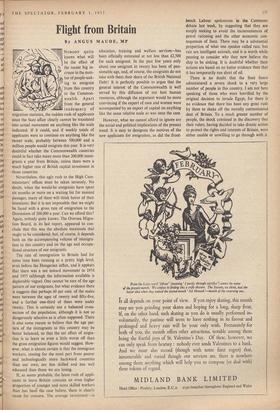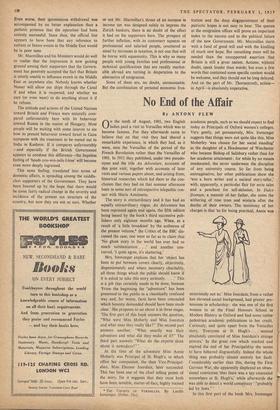Flight from Britain
By ANGUS MAUDE, MP
Nevertheless, this ugly rush to the High Com- missioners' offices must be taken seriously. No doubt, when the would-be emigrants have spent six .months or more on a waiting list for assisted passages, many of them will think better of their intentions. But it is not impossible that we might be faced with a gross rate of emigration to the Dominions of 200,000 a year. Can we afford this? Again, nobody quite knows. The Oversea Migra- tion Board, in its last report, appeared to con- clude that this was the absolute maximum that ought to be considered; but, of course, it depends both on the accompanying volume of immigra- tion to this country and on the age and occupa- tional structure of our emigrants.
The rate of immigration to Britain had for some time been running at a pretty high level, even before the Hungarian influx, and it app'ears that there was a net inward movement in 1954 and 1955 (although the information available is deplorably vague). One cannot be sure of the age pattern of our emigrants, but what evidence there is suggests that perhaps 60 per cent. of the males were between the ages of twenty and fifty-five, and a further one-third of them were under twenty. This is certainly not a balanced cross- section of the population, although it is not so dangerously selective as is often supposed. There is also some reason to believe that the age pat- tern of the immigrants to this country may be better balanced, so that the net effect of migra- tion is to leave us even a little worse off than the gross emigration figures would suggest. How- ever, what is almost certain is that the immigrant workers, coming for the most part from poorer and technologically more backward countries than our own, are less skilled and less well educated than those we are losing.
If, as seems probable, the latest rush of appli- cants to leave Britain contains an even higher proportion of younger and more skilled workers than has been the case before, there is clearly cause for concern. The average investment—in education, training and welfare services—has been officially estimated at not less than f2,500 for each emigrant. In the past few years only about one emigrant in twenty has been of pen- sionable age, and, of course, the emigrants do not take with them their share of the British National Debt! It is perfectly possible to argue that the general interest of the Commonwealth is well served by this diffusion of our best human resources, although the argument would be more convincing if the export of men and women were accompanied by an export of capital on anything like the same relative scale as was once the case.
However, what we cannot afford to ignore are the social and political implications of the present trend. It is easy to denigrate the motives of the new applicants for emigration, as did the front- bench Labour spokesman in the Commons debate last week, by suggesting that they are simply seeking to avoid the inconveniences of petrol rationing and the other economic con- sequences of Suez. There may be a substantial proportion of what one speaker called rats; but rats are intelligent animals, and it is worth while pausing to consider why they now believe the ship to be sinking. It is doubtful whether their actions are based on no better evidence than that it has temporarily run short of oil.
There is no doubt that the Suez fiasco administered a severe shock to a very large number of people in this country. I am not here speaking of those who were horrified by the original decision to invade Egypt, for there is no evidence that there has been any great rush by them to shake off the morally contaminated dust of Britain. To a much greater number of people, the shock consisted in the discovery that their rulers, having decided to take drastic action to protect the rights and interests of Britain, were either unable or unwilling to go through with it. Even worse, their ignominious withdrawal was accompanied by no better explanation than a pathetic pretence that the operation had been entirely successful. Since then, the official line appears to have been that any reference to current or future events in the Middle East would be in poor taste.
Mr. Macmillan and his Ministers would do well to realise that the impression is now gaining ground among their supporters that the Govern- ment has passively accepted the fact that Britain is utterly unable to influence events in the Middle East or anywhere else. Nobody knows whether Nasser will allow our ships through the Canal if and when it is reopened, and whether we care (or even want) to do anything about it if he refuses.
The attitude and actions of the United Nations toward Britain and France were naturally com- pared unfavourably here with its behaviour toward Russia in the matter of Hungary. Most people will be waiting with some interest to see how its present behaviour toward Israel in Gaza compares with the treatment to be meted out to India in Kashmir. If it compares unfavourably —and especially if the British Government appears to condone this difference--the hopeless feeling of 'heads-you-win-tails-l-lose' will become even more deeply ingrained.
This same feeling, translated into terms of domestic affairs, is spreading among the middle- class supporters of the Government. They have been buoyed up by the .hope that there would be some fairly radical change in the severity and incidence of the present tax structure of the country, but now they are not so sure. Whether
or not Mr. Macmillan's threat of an increase in income tax was designed solely to impress the Zurich bankers, there is no doubt of the effect it had on his supporters here. The prospect of further inflation, with its customary squeeze on professional and salaried people, countered as usual by increases in taxation, is not one that will be borne with equanimity. This is why so many people with young families and professional or technical qualifications that are readily market- able abroad are turning in desperation to the alternative of emigration.
Some of them are, no doubt, unreasonable. But the combination of personal economic frus-
tration and the deep disfppointment of their patriotic hopes is not easy to bear. The queues at the emigration offices will prove an important index to the success and to the political future of the new Government. Mr. Macmillan starts with a fund of good will and with the kindling of much new hope. But something more will be needed than the unsupported assertion that, Britain is still a great nation. Actions, without doubt, speak louder than words; but even a few words that contained some specific content would be welcome, and they should not be long delayed. And on the part of Mr. Thorneycroft, action— in April—is absolutely imperative.



































 Previous page
Previous page